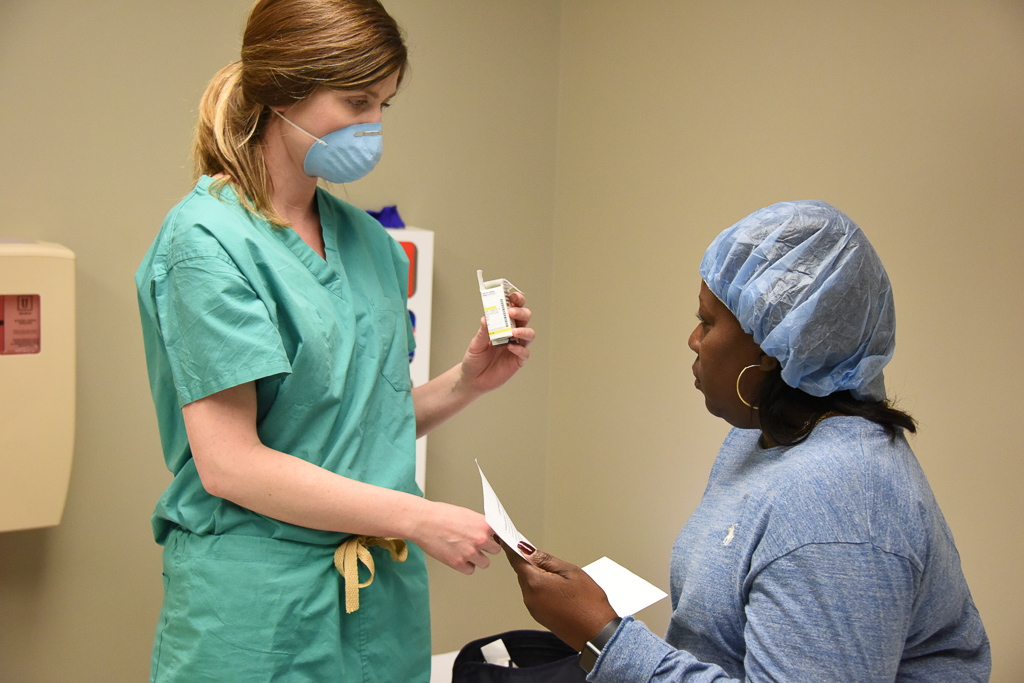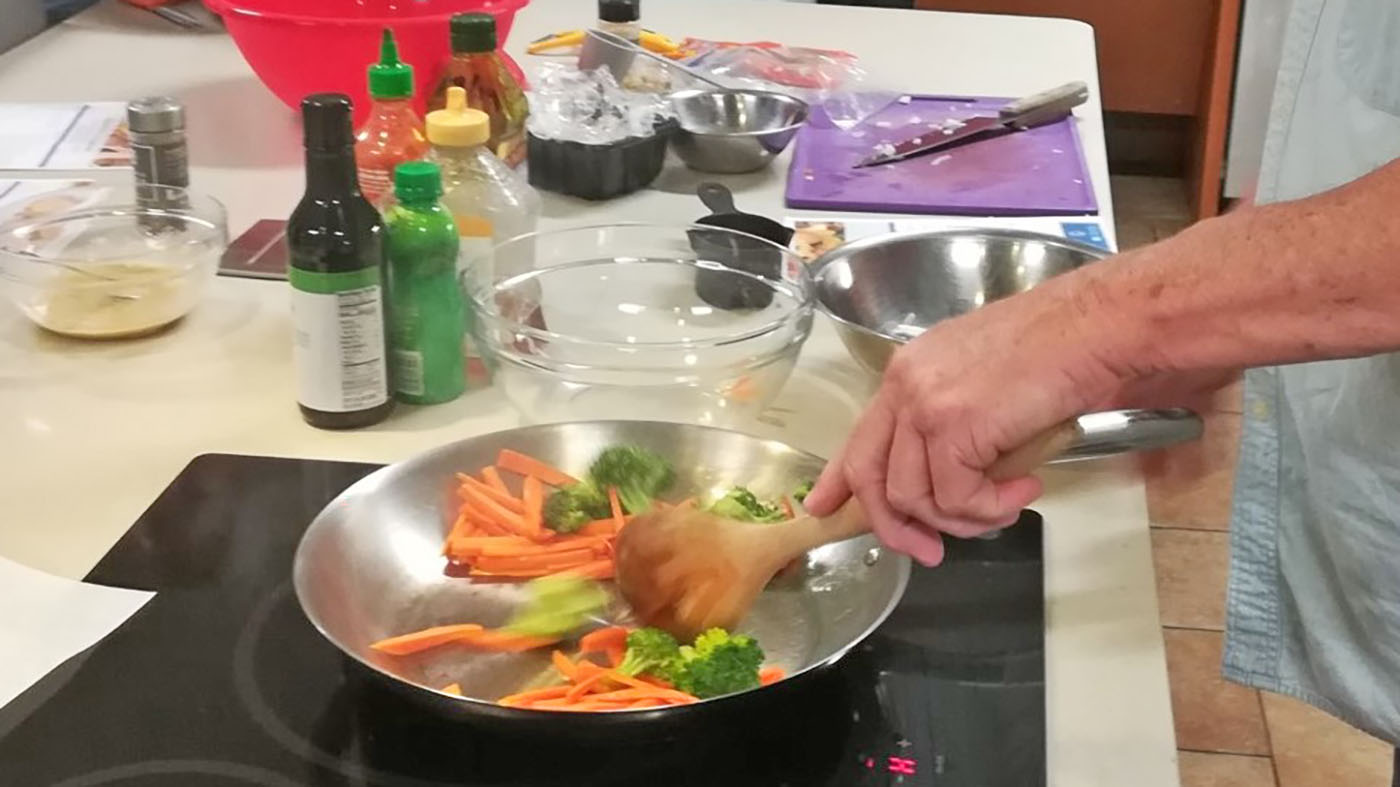The future is in sight at the new Orleans VA: Dr. Jody Simon performed the first corneal collagen crosslinking (CXL) procedure ever completed at a VA medical center.
Not just new at VA, CXL is a new procedure in the United States. Approved by the FDA in 2016 for the treatment of Keratoconus and Corneal Ectasia, this cutting edge, innovative procedure can be very expensive and is not covered by many insurance companies. The Veteran who worked with Dr. Simon transferred to the New Orleans VA, part of the Southeast Louisiana Veterans Health Care System (SLVHCS), from the Manhattan VA for the procedure. Since then, Veterans from the El Paso VA and the Houston VA have been referred to New Orleans to see if they might be candidates for the procedure.

Dr. Jody Simon performed the first corneal collagen crosslinking (CXL) procedure ever completed at a VA medical center.
“I’m happy to have this technology to serve our Veterans,” Dr. Simon said. “If you try to perform this procedure outside VA, it can be very expensive. It’s nice to be able to provide it to anyone who needs it who qualifies for VA care. We’d like to recruit any Veterans who feel they would benefit from corneal crosslinking.”
As explained by Dr. Rebecca Metzinger, SLVHCS chief of Ophthalmology, CXL is a treatment for a progressive disease called keratoconus, which can lead to the cornea thinning and bowing out (forming a cone shape) and scarring that can lead to loss of vision and the need for corneal transplantation.
Dr. Simon explained the goal of CXL is not to improve vision, though some people might experience some improvement afterward. For instance, if a patient is wearing therapeutic hard contact lenses before the procedure, they will likely still need them. The goal of this procedure is to stabilize the eye so that the disease does not progress.
Dr. Simon said, “If the disease does progress, it makes a patient’s vision very, very blurry and they could progress to the point where contact lenses are intolerable because it doesn’t fit on their eye anymore or it’s painful. They may need a corneal transplant later on. That’s about a year-long recovery process. If you can prevent that early on before the disease progresses, I think that’s a really big benefit to people.”
Dr. Metzinger explained how the procedure is performed, saying, “Essentially the corneal epithelium is removed, and the cornea is soaked with riboflavin and UV light is directed on to the cornea (via the FDA – approved AVEDRO device) to strengthen the collagen and stabilize the eye.”
Even though the description of the procedure sounds painful because the doctor basically scrapes the surface (epithelial) cells off the cornea of the eye, it really isn’t bad.
“The patient can’t feel it at the time of the procedure. We numb the eye with topical numbing drops, there are no injections. It’s not very invasive. They don’t need any other anesthesia,” Dr. Simon said. “The recovery time is about a week. They have some blurry vision at first, a few days of discomfort where they feel like something is in their eye and they’re sensitive to light. After that, things normalize between one and three months.”
Bringing it all home
Dr. Simon isn’t letting it go to her head that she is the first doctor in the VA health care system, and one of the first doctors in the country, to perform this procedure.
“It’s really nice to work with some of the leaders in the field of corneal crosslinking and people who study biomechanics of the cornea. It’s nice to be able to come here and use everything I’ve learned to really help the patients.”
“The department of surgery is really excited to be able to offer such a cutting-edge technique to the Veterans,” said Dr. Lynn Chao, Chief of Surgery Service. “We are grateful to be able to attract someone as talented as Dr. Simon to our service.”
“We are proud of Dr. Simon and her colleagues,” agreed SLVHCS Director Fernando Rivera. “Achievements like this serve to remind us that the VA has always been on the forefront of new medicine, from the first clinically successful implantable cardiac pacemaker, to the nicotine patch and the standing wheelchair. We are proud to have the best and brightest doctors serving those who so bravely served our country.”
Dr. Simon agrees it’s an honor to work for our nation’s heroes. “I have a cousin who is a Navy Seal. My grandfather was in WWII and he always used the VA and had really good experiences. I just took a trip to Normandy with my family this year, and I saw where my grandfather fought on the beach. That brought it all home. I really enjoy working with Veterans.”
If you are a Veteran who has been diagnosed with keratoconus or would like to find out if you are a candidate for corneal crosslinking, your primary care physician can refer you to the SLVHCS ophthalmology clinic. Screenings for corneal crosslinking are done in the cornea clinic every Wednesday.
Jamie Mobley is a public affairs specialist at the Southeast Louisiana Veterans Health Care System in New Orleans. She is an Army Veteran and a graduate of Kansas State University.
Topics in this story
More Stories
VA promotes early nutrition intervention for chronic kidney disease with targeted programs like Heathier Kidneys Through Your Kitchen.
VA Research Advisory Committee on Gulf War Veterans’ Illnesses hosting Veteran Engagement Sessions in Phoenix for 1990-91 Gulf War Veterans.
Navy Veteran and president of the American Medical Association got a colonoscopy and encourages other Veterans to do the same.







Thank you for all you do!! It’s very nice too hear a Doctor that cares for the patients.
Thanks to all the VA Doctors & nurses at the Omaha VA that have given me excellent service for years!
Yes, she’s one of those smart cookies the VA has… Bravo Dr. Jody Simon.
Awesome news! I had corneal transplants this year, so very interesting to see this! TY for your service
Thank you to all the VA doctors for your service to the Military veterans.